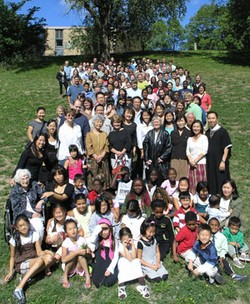Less than a decade old, Church of All Nations, a church plant out of the Korean immigrant context, has not only taken root but is already bearing fruit.
Not only has it helped to launch three worshiping communities, but the multi-ethnic church that is living into its name to be of “all nations” is also in conversation with two struggling local congregations regarding the potential of a partnership “relaunch.”
The Twin Cities area of Minnesota — home to Church of All Nations — is also home to many new immigrant groups.
“One of these groups — from the Côte d'Ivoire (Ivory Coast) — came to us and asked, ‘Are you really a church of all nations?’ shared Pastor Jin Kim. The group of French-speaking, Parisian-based, Pentecostal West Africans had been worshipping in a local Lutheran church with free rent but stringent requirements for use of the space.
“We said, of course you can worship here and you don’t have to pay rent,” said Kim. “So they took a Sunday school room and made it into a chapel with their own colors and fabrics.”
After a year and a half of this they asked if they might simply merge with the Church of All Nations. “They were Pentecostal but they cut off those relations and said that they were going to become Presbyterian—even though none of them had any background with Presbyterians,” said Kim. It was the relationship, rather than the denominational affiliation, that had become central.
Not long after, the French-speaking group hosted an eight-day revival. During the revival they met and hosted a group of English-speaking West Africans, from Liberia. “The French-speaking group had a worship space but not a pastor. As it happened, the English-speaking group had a pastor but had outgrown their house church,” said Kim. So the two groups decided to merge.
“Even though they have different languages, they are neighboring countries in West Africa — they’re divided more by the legacy of colonialism than by anything else,” said Kim.
“After three years of using our space, last month they decided that they are going to make a $400/month contribution — not rent, but an offering,” said Kim. “We have contributed to them, and now we are seeing the fruit of that.”
Church of All Nations is also in conversation with two other struggling congregations, each down to about 50 members, who are considering a “relaunch” in partnership with Church of All Nations.
“They would remain in their respective sites, but it would basically mean us infusing them with our DNA, our ethos, our vision and our identity for them to become missional communities right where they are,” said Kim.
“The plan would be to work with the existing pastors — I don’t believe in projecting some pastor’s image onto other screens,” continued Kim. “These would be real congregations with their own leaders and their own congregational life, but our church would provide the initial rebooting of the congregational identity.
“More than programmatic, we hope that the ministry of presence is what will have the most long-lasting and enduring impact,” said Kim.
Kim admits it will not be easy for Church of All Nations. “The people in our church are intensely loyal to this church because it has been so transformative to them. But we teach that to those whom much has been given, much is required.”
“It is a huge sacrifice for us — we are barely eight years old ourselves and still trying to get our legs,” said Kim. “But we have to take that risk.” Risk, according to Kim, is part of the calling.
“None of the churches that existed in the New Testament lasted for more than 100-200 years at the most, so it seems to me that maybe God is not all that interested in institutional longevity.”
“I know so many churches in our denomination that are down to about 25 older white people and they are hosting an immigrant congregation with 150 people. Why don’t they say, ‘We had a good run and this is God’s building and we are going to turn it over now?’ ”
That turning over is how the Church of All Nations found itself, two years after being planted, owners of a building themselves — a story that goes back over 100 years, to 1884.
The year 1884 happens to have been the year that American Presbyterian missionaries first traveled to Korea, as well as the year that Shiloh Bethany (Grace) Presbyterian Church was founded in the Twin Cities area.
In 2006 the struggling 122-year-old congregation of Shiloh Bethany, down to about 25 members, invited the two-year-old congregation of Church of All Nations to rent their church building.
“They first invited us to rent their building, but then they said ‘We should merge with you.’ So, they gave us their building, they got new life by giving us their building” said Kim. What’s interesting is that Church of All Nations was founded out of a Korean immigrant context,” “Shiloh Bethany was founded in 1884 — the year that American Presbyterian ministers first came to my home country of Korea. So, 122 years later, a Korean-based multicultural church gave new life to the very people that gave us life in the first place.”

